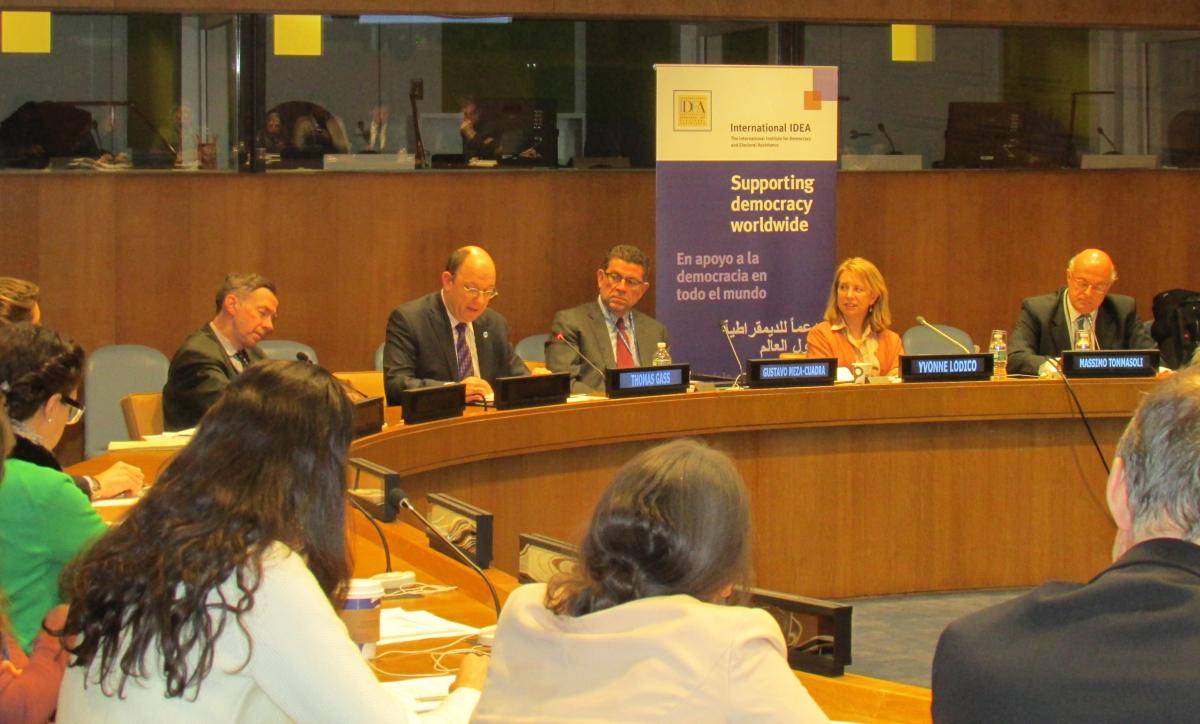UNITAR New York Office and International IDEA Organize a Seminar on Inclusive Societies
 06 February 2015, New York, USA – The UNITAR New York Office organized a seminar in cooperation with International Institute for Democracy and Electoral Assistance (IDEA), entitled: Peaceful and Inclusive Societies and Democratic Governance. The half-day seminar aimed to raise awareness on the importance of peace and inclusive societies and democratic governance within the sustainable development framework, to frame the discussion of linkages between democratic governance and sustainable development within the framework of the ongoing debate on Sustainable Development Goals. Over 30 participants at the seminar included delegates from the Permanent Representatives of 22 countries, as well as representatives of non-governmental and intergovernmental organizations.
06 February 2015, New York, USA – The UNITAR New York Office organized a seminar in cooperation with International Institute for Democracy and Electoral Assistance (IDEA), entitled: Peaceful and Inclusive Societies and Democratic Governance. The half-day seminar aimed to raise awareness on the importance of peace and inclusive societies and democratic governance within the sustainable development framework, to frame the discussion of linkages between democratic governance and sustainable development within the framework of the ongoing debate on Sustainable Development Goals. Over 30 participants at the seminar included delegates from the Permanent Representatives of 22 countries, as well as representatives of non-governmental and intergovernmental organizations.
The workshop aimed at raising awareness on the importance of peace and inclusive societies and democratic governance within the sustainable development framework, focusing on Sustainable Development Goal (SDG) 2016. The workshop included not only expert presentations but also interactive questions and comments of delegates of Permanent Missions to the United Nations and other representatives of international, intergovernmental and non-governmental organizations.
Mr. Massimo Tommasoli, Permanent Observer for IDEA to the UN, opened the meeting together with Ms. Yvonne Lodico, Head of the UNITAR New York Office. Mr. Tommasoli highlighted the work schedule and future perspectives of the SDG 2016, overviewing basic concepts and their inter-connections with his paper. He also stressed the importance of the implementation mechanism of the new SDG 2016. At the opening remarks HE Mr. Gustavo Meza-Cuadra, Permanent Representative of Peru to the UN, provided his perspectives on the impact of peaceful society and rule of law on the development, the implementation means of SDG 2016, Peru’s position and works for the sustainable development. He explained the drafting process, particularly political compromise towards the final agreement. Replying to an audience question, HE Mr. Meza-Cuadra stressed the importance of involving various UN bodies including the Security Council and General Assembly as well as accountability.
During the first presentation, Dr. Timothy Sisk, Associate Dean for Research at the Korbel School of International Studies, University of Denver, overviewed scholarly evidence to support the SDG 2016 and his efforts to bridge gaps between academia and practitioners for the SDG 2016, particularly the correlation between the reduction of armed conflicts and development, basing various empirical findings of past conflict situations. Series of academic support data indicate the strong correlation between peace, development and inclusive governance. Social violence gave negative effect on development; inclusivity and democratic participation contributed to development and peace; and social cohesion produced peace building. Dr. Sisk concluded four priority areas: peace building, access to justice, state capacity building and participation in governance. Ms. Lodico added the national ownership concept for future dialogue. Replying to questions, Dr. Sisk recognized a new issue of the state autonomy with regard to the access to justice. Imbalances of development and inclusiveness in a couple of middle-income countries were also discussed.
The second presentation of Mr. Thomas Gass, Assistant Director-General, UN DESA, overviewed the MDG and commented the difference between the MDGs and SDG. Though the SDG does not always cover the most pressing issues but is shared by all member states. Basing his experience in Nepal, Mr. Gass stressed to identify the most vulnerable groups and risks in order to build resilience. He also overviewed transformative agenda towards the Summit in September 2015 and raised the attention for the political review mechanism to cover all seventeen goals as well as thematic review process. Mr. Gass expected a new approach for the SDG 2016.
Mr. Tommasoli summarized the discussion and found that three main elements, i.e. peace, justice and institution, were inter-related. For the future discussion, he proposed key elements for the discussion and solicited feedback to the draft.
Related link
The seminar is available live on UN webcast.

